Background:
The Stratified Automotive Controls IS20 Stage 2 tune is one of several Cobb-based off-the-shelf (OTS) tunes with which a performance comparison was made. Stratified offers a tune revision option where they will update their off-the-shelf tune based on the customer’s data log to make a quasi-custom tune.

This revision of my IS20 tune resulted in a slight increase in peak wheel horsepower and decreased Dragy acceleration time. The tune also operated at the threshold of ignition timing reduction becoming a regular event during a full throttle pull. Details about this were published in this post.
Occasionally I have read statements about ignition timing retard and possible causes that are something other than engine knock. For example, stiff motor mounts, aftermarket charge pipes, the Mk7 having an inherently noisy engine, or Volkswagen engineers being overly cautious in their implementation of knock prevention and mitigation.
I decided to investigate if the revised tune was operating at the point of causing knock retard based on knock events, or if something else was causing the timing reduction.
Test Procedure:
The GTI would be accelerated in third gear at full throttle beginning at an engine speed of around 2000 RPM and concluding at an engine speed past 6300 RPM. After slowing the vehicle the process would be repeated. This was repeated several times for both test cases.
Engine knock can be correlated to the fuel octane rating. For this comparison, the control pulls that were previously logged used 93 octane fuel with an ethanol percentage of 10%.
For the test pulls the ethanol percentage would be increased to 20%.
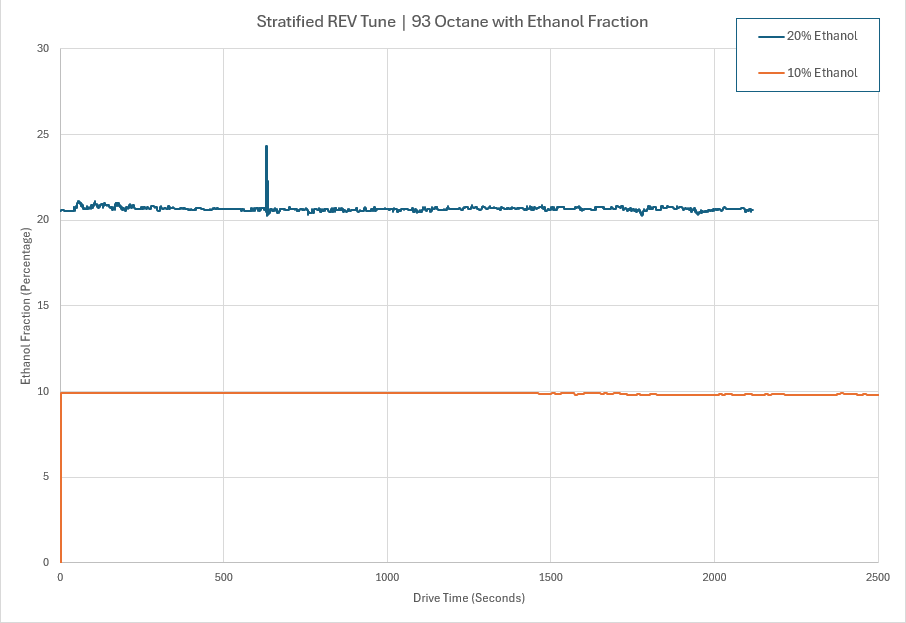
Test Results:
A series of five (5) pulls using the 20% ethanol fuel are shown below with a boost pressure curve and ignition timing retard occurrences for all cylinders:
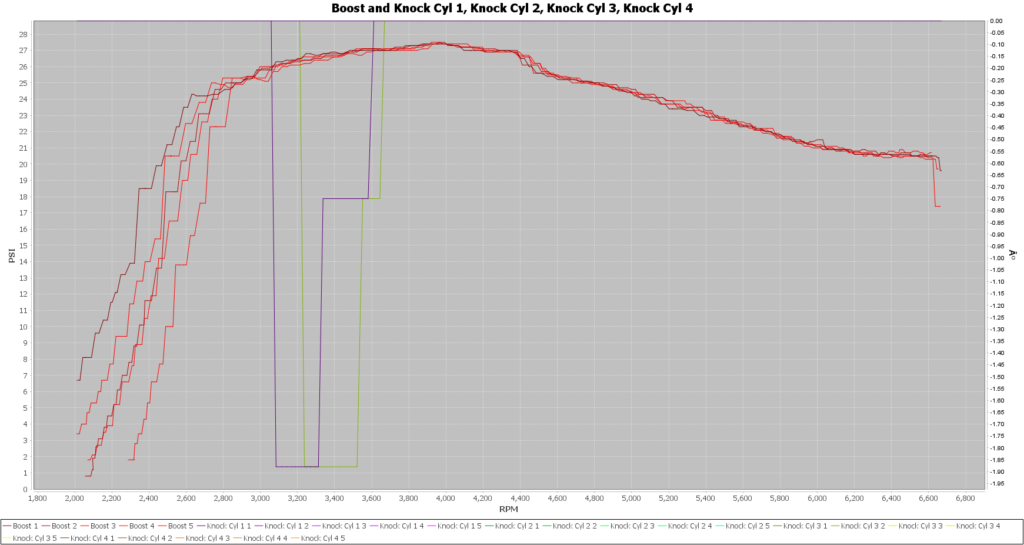
This is a significant reduction in the occurrences of timing retard compared with the 10% ethanol content fuel, shown below:
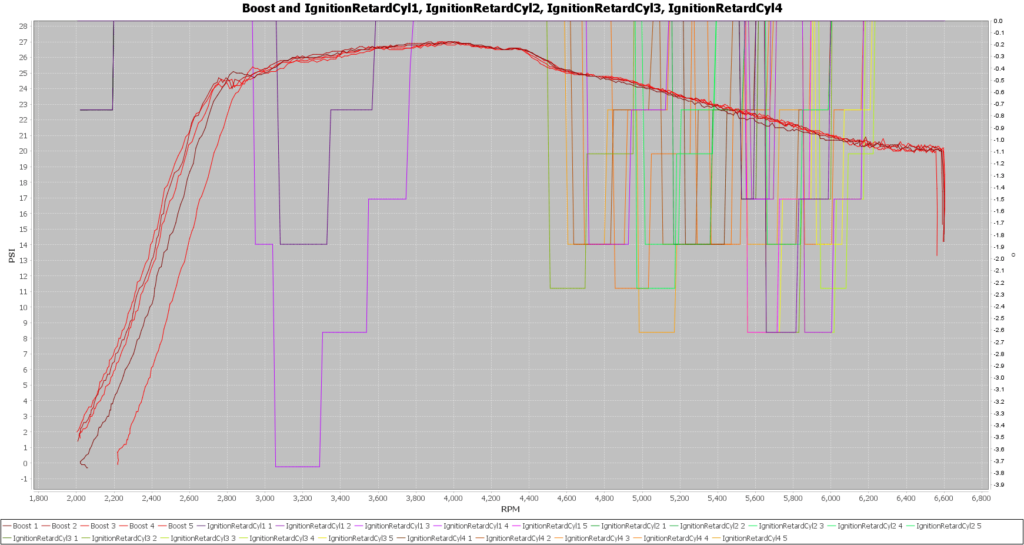
KR %
The control pulls (10% ethanol fraction) are shown below with occurrences of timing retard indicated by the white vertical lines.
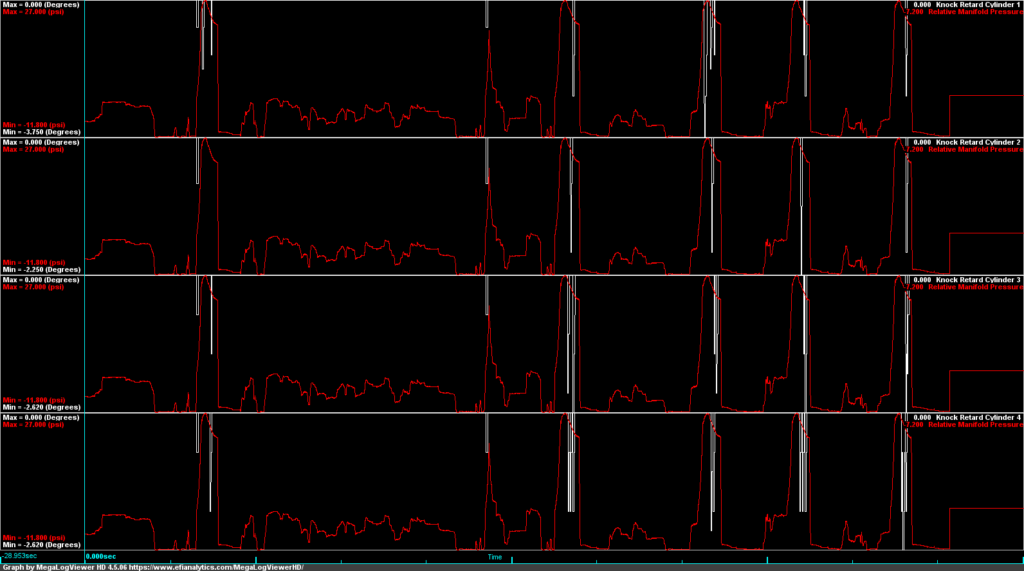
After increasing the ethanol content to 20% a series of full-throttle pulls are made and the result is shown below:
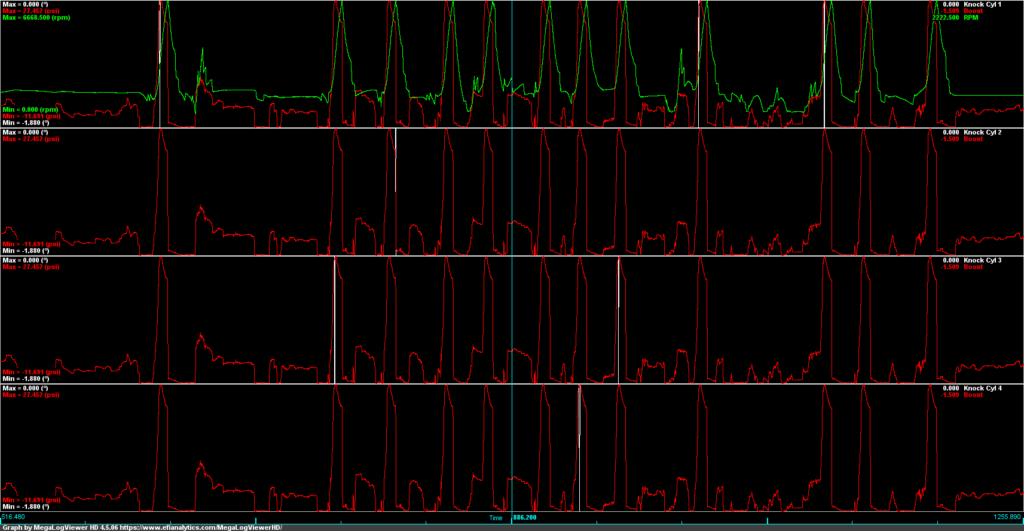
The increase in the Ethanol percentage leads to a dramatic decrease in Knock Retard occurrences (KR %).
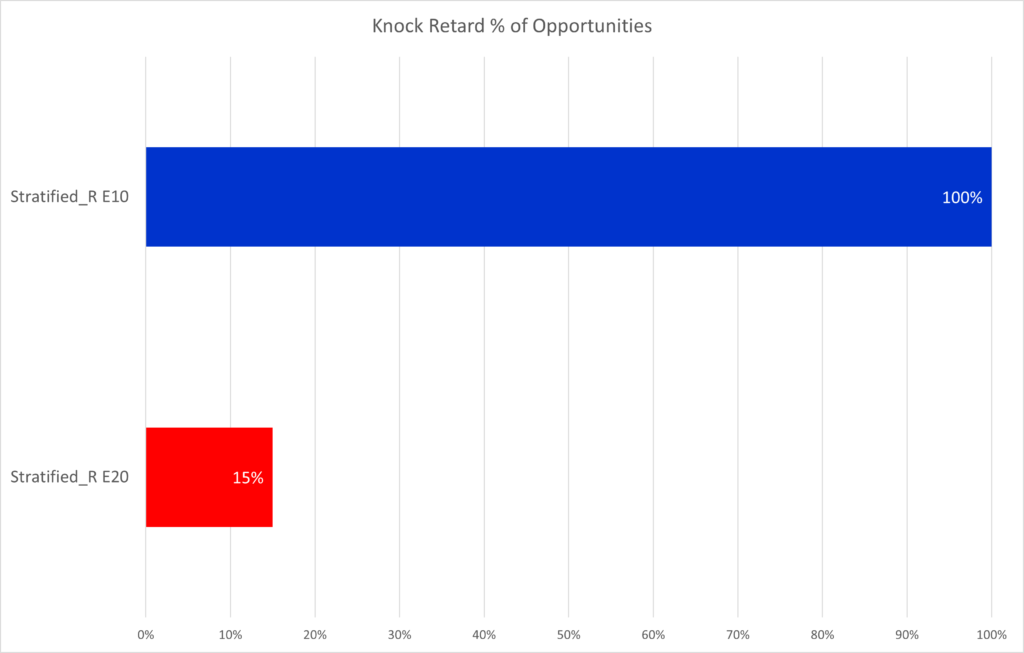
The significant decrease in the number of occurrences of timing being retarded is a beneficial outcome in my opinion.
Note: It’s worth noting that the occurrence of knock can range from mild to severe, and without the aid of cylinder pressure sensors to verify the correlation between knock events and overpressure, secondary indicators are relied upon to estimate what is taking place within the cylinder. To that end, the knock sensor picks up sounds for the ECU to process. Infrequent and small timing corrections are assumed to indicate minor knock, whereas large amounts of timing pull or sustained and growing timing pull may indicate a more severe occurrence of knock. This assumes the knock management settings are unchanged from the OEM-developed settings, which evidence from the Cobb-tune tests shows is not always the case.
Conclusions:
A Stratified Automotive Controls tune for the Mk7 with IS20 turbocharger was customized to operate at boost and timing levels that resulted in frequent ignition timing reduction when operating with 93 octane fuel containing 10% ethanol.
An experiment raising the ethanol percentage of the fuel to 20% was performed to determine if the ignition timing retard was due to engine knock, or some other cause.
Increasing the Ethanol percentage in 93 octane fuel from 10% to 20% resulted in a drop in the occurrences of ignition timing retard during full throttle pulls from 100% of opportunities to 15% of opportunities.
This outcome indicates that the timing retard occurrences observed with the 10% ethanol fuel were a result of “knock events” and were not caused by a noisy engine, stiff motor mounts, aftermarket charge pipes, or overly cautious VW engineers.
References:
Addendum:
Averages for each cylinder compared.
Green is E10, Blue is E20.

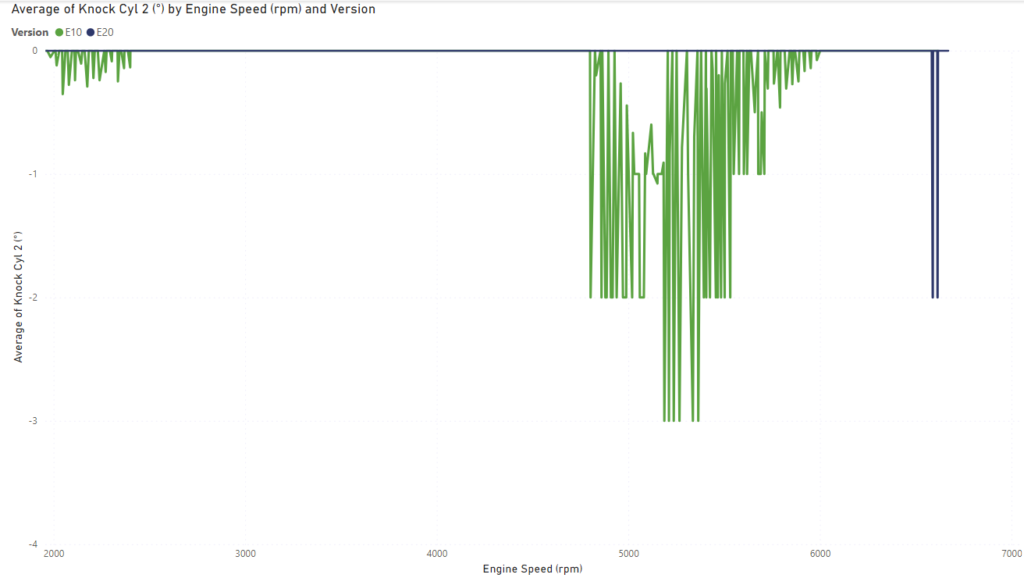
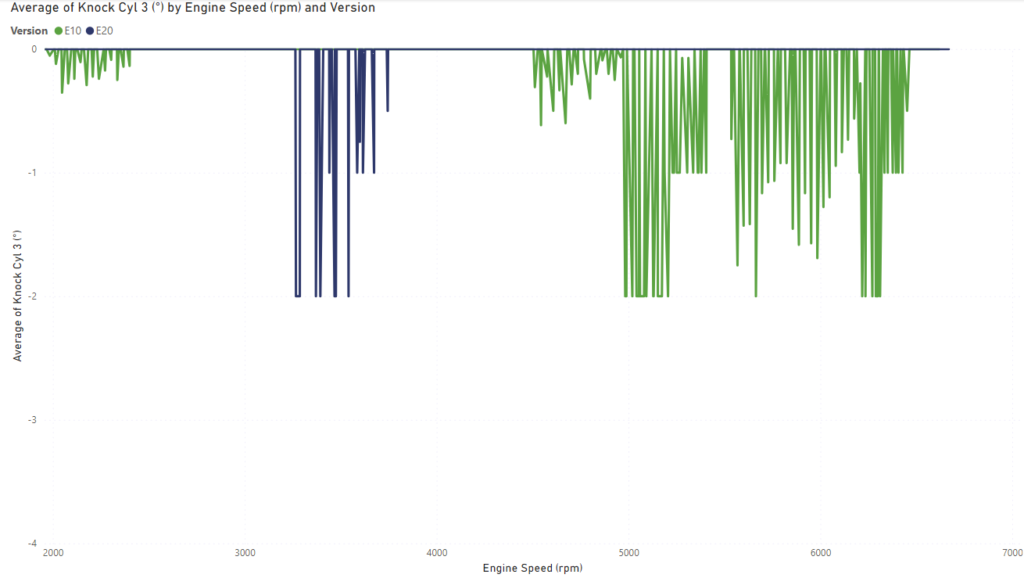
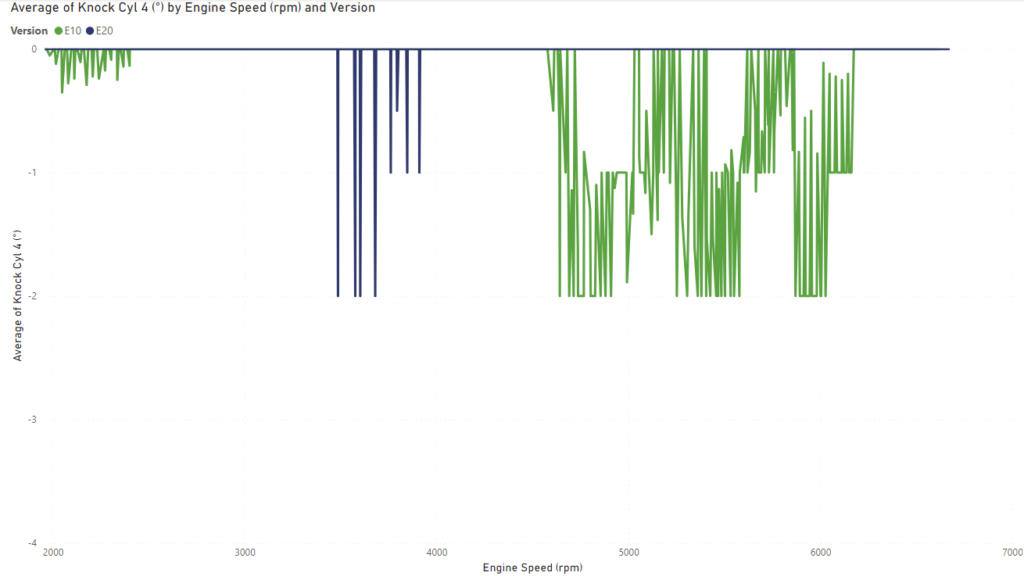

Good stuff – It doesn’t appear that the E20 cleared up any of the low RPM, high load knock? It’s the only type of knock I seem to pick up from the strat tune. Are you seeing reduction below 4k RPM? It does seem conclusive that the high RPM knock was cleared up with E20. Playing devil’s advocate – I have stiff stage 1 BFI mounts and I would imagine if they did contribute to knock, it would be in the low RPM, high load scenarios starting around ~2800RPM. I’m due for spark plugs and I’ll see if that helps in the low range…then I’ll try some E85. I want to know if I can pull out any knock before I go through the rev process with strat myself. Thanks!
I agree that at the low RPM condition the logs don’t show much reduction in the amount of KR from the 10% increase in the E85 percentage. I’m unsure what you’re asking about with the reduction below 4k RPM.
low RPM and below 4k RPM was the same question. The low RPM question revolved around was what I was seeing here and my direct question below 4k RPM was what you may be seeing beyond with data, perhaps not shown here. In the low RPM (below 4k) area, it looks like conclusions of this study may not be applicable as we didn’t see reductions there.
I understand the question now. Based upon the information I have I agree that the fuel change did not appreciably change the KR below 4k. I made a dozen pulls with the E20 mix, perhaps with more data it would lead to a clearer picture in relation to this question. I’ve added charts with the average values for each cyinder.
Yes! The appendix helps greatly. Thanks for that – good stuff. E85 is a real pain for me to get so this is great.